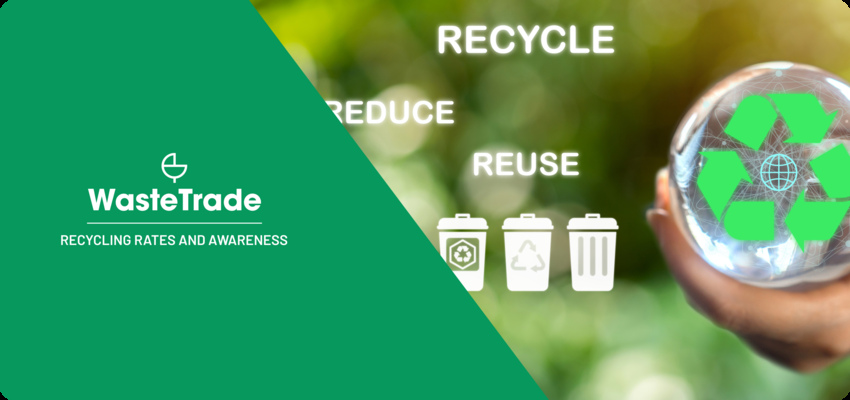Ratele de reciclare și gradul de conștientizare

Welcome to WasteTrade, your go-to global waste marketplace where buyers and sellers of waste materials come together. This article explores Recycling Rates and Awareness, emphasising the importance of sustainable practices in our modern world. From a global overview to detailed insights on UK recycling rates, we examine key trends and strategies to improve recycling. Join us as we navigate the challenges and opportunities in fostering environmental consciousness and enhancing recycling efficiency.
Ratele de reciclare Uk

The UK’s recycling rates have been steadily improving, reflecting a growing commitment to environmental sustainability. In 2020, the UK achieved a national recycling rate of 45.5%, a notable increase from previous years. This progress results from enhanced access to recycling facilities, improved waste management practices, and focused recycling education and awareness campaigns.
However, there is still room for improvement. Some regions lag in recycling rates, necessitating targeted initiatives and support. The UK also faces challenges with specific waste types, such as plastic packaging and electronic waste, requiring innovative solutions to boost recycling further. Continued collaboration between the government, businesses, and individuals is crucial for driving further improvements and achieving a sustainable future.
By following these strategies and fostering a culture of recycling, we can significantly enhance recycling rates, reduce environmental impact, and create a sustainable future for all.
Practici de reciclare durabilă

Adopting sustainable recycling practices is essential for minimising environmental impact and conserving resources. In the UK, initiatives like kerbside recycling programmes and household waste segregation are standard, promoting proper waste management. By separating recyclables such as paper, plastic, glass, and metal from general waste, these practices divert materials from landfills to recycling facilities.
The UK government also champions the use of recycled materials in various industries to support a circular economy. Integrating recycled content into manufacturing processes helps businesses reduce their carbon footprint and develop a market for recycled products. This holistic recycling approach not only addresses waste management but also conserves natural resources and reduces the need for raw materials. As more people and organisations adopt sustainable recycling, the UK progresses towards its environmental goals, fostering a greener future.
Conștientizarea beneficiilor reciclării
Raising awareness about recycling benefits is key to driving positive community changes. Educating individuals on the environmental impacts of waste and the advantages of recycling promotes a sustainable lifestyle. Recycling reduces landfill waste, conserves natural resources, and decreases pollution. Encouraging recycling habits contributes to a healthier planet for future generations.
Recycling also offers economic benefits by reducing raw material needs and lowering manufacturing costs. Recycled materials can be used to create new products, supporting a circular economy and enhancing resource efficiency. By highlighting these benefits, we can foster a recycling culture that benefits both the environment and the economy, paving the way for a sustainable future.
Îmbunătățirea ratelor de reciclare
Boosting recycling rates in the UK is vital for environmental sustainability. Raising public awareness about the importance of recycling and its benefits is an effective strategy. Educating people on recyclable items and proper disposal methods helps them make informed waste management choices. Community workshops, school programmes, and public campaigns play crucial roles in spreading awareness and encouraging responsible recycling.
Moreover, convenient and accessible recycling infrastructure is essential for increasing recycling rates. Providing user-friendly recycling bins in public areas, workplaces, and homes encourages more people to recycle. Collaboration between local authorities and businesses ensures that recycling facilities are readily available and collections are efficient. Making recycling more convenient and accessible helps create a sustainability culture, reducing landfill waste and fostering a cleaner environment.
